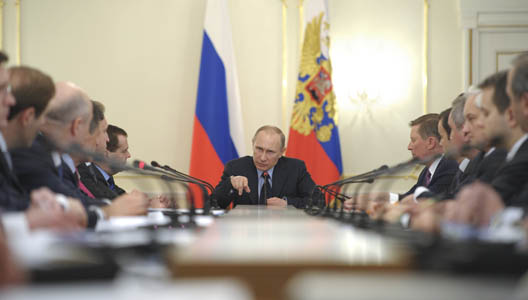 Every week a selection of leading experts answer a new question from Judy Dempsey, nonresident senior associate at Carnegie Europe and editor-on-chief of Strategic Europe, on the foreign and security policy challenges shaping Europe’s role in the world. This week the roster of experts included the Council’s Ian Brzezinski and Damon Wilson.
Every week a selection of leading experts answer a new question from Judy Dempsey, nonresident senior associate at Carnegie Europe and editor-on-chief of Strategic Europe, on the foreign and security policy challenges shaping Europe’s role in the world. This week the roster of experts included the Council’s Ian Brzezinski and Damon Wilson.
Will Putin Finally Wake Up Europe?
Ian Brzezinski
If Russian President Vladimir Putin’s provocative territorial grab in Ukraine is to be reversed, more than Europe will have wake up. The transatlantic community as a whole will have to demonstrate the commitment necessary to make Russian forces return to their barracks.
NATO, U.S., and EU leaders have warned of grave consequences for Russia should it continue its incursion into Ukraine. Some have suggested economic and political sanctions, including Russia’s expulsion from the G8 group of industrialized nations, suspension of trade negotiations, and the freezing of Russian corporate assets.
Yet, the West still balks at taking even defensive military actions that would reinforce Ukraine’s security, reassure NATO’s Eastern members, and complicate Russia’s military planning. Such actions could include mobilizing NATO’s rapid-reaction Response Force, deploying defense assets to Central Europe and the Black Sea, and providing security assistance to Ukraine.
Economic and political sanctions are necessary but unlikely to be sufficient to compel Putin to reverse course. He has surely concluded that he can ride out those consequences, just as he did after invading Georgia in 2008. Meanwhile, if NATO limits its role in this crisis to consultations, its relevance as a security institution will be significantly diminished.
Damon Wilson
Over recent years, European defense policies have resulted in an ever weaker political commitment to the transatlantic alliance. Vladimir Putin may stop this downward spiral—but not overnight. Just as Europe was slow to appreciate the gathering storms in the 1930s, many Europeans have so far concluded that Putin’s increasing authoritarianism at home and aggression against his neighbors would not affect them.
They were wrong. Putin has succeeded in reconstituting his ability to project Russian power into the heart of Europe. More seaworthy Russian ships now patrol the Arctic and Baltic Seas, where they were once absent. More capable Russian forces are now concentrated on NATO’s Baltic border. More accurate Russian missiles now target Poland and Romania. More lethal fighter aircraft routinely violate Swedish and Finnish airspace. And Russia more often exercises land invasions of Europe.
Under Putin, Russia has been hard at work to reverse the outcome of the Cold War. He has played a zero-sum game even as the West has insisted it is not. Russian forces now occupy territory in Ukraine, Georgia, and Moldova. Coercion has produced feigned fealty in Belarus, Armenia, and part of Central Asia.
Europe is waking up. But many are attempted to hit the snooze button just one more time. They should resist—for the sake of those in Baltic and Europe’s East.
Image: Russian President Vladimir Putin chairs a Russian government meeting in the Novo-Ogaryovo residence outside Moscow March 5, 2014. REUTERS/Alexei Druzhinin/RIA Novosti/Kremlin
